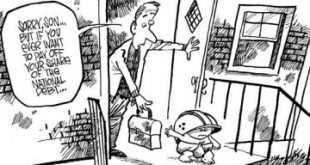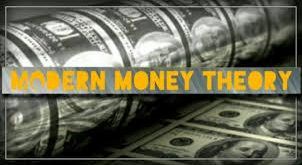What’s wrong with MMT? Nothing! MMTists often like to position themselves as the only ones to properly understand the ‘operational realities’ of modern monetary systems. Ironically, many of the claims made by MMTists on this topic are misleading at best. One common rhetorical tactic that I’ve noticed they employ, which often catches their critics out, is to use the term ‘government’ in a way that’s different typically from how it is used in mainstream...
Read More »Abba Lerner and the true nature of public debt
Abba Lerner and the true nature of public debt One of the most effective ways of clearing up this most serious of all semantic confusions is to point out that private debt differs from national debt in being external. It is owed by one person to others. That is what makes it burdensome. Because it is interpersonal the proper analogy is not to national debt but to international debt … But this does not hold for national debt which is owed by the nation to...
Read More »Equilibrium — an assumption making many theories inaccurate
Equilibrium — an assumption making many theories inaccurate For the learning rules we study, the players never converge to any sort of “intertemporal equilibrium”, in the sense that their expectations do not match the outcomes of the game even in a statistical sense … Are these results relevant for macroeconomics? Can we expect insights that hold at the small scale of strategic interactions between two players to also be valid at much larger scales? While...
Read More »Monismus in der ökonomischen Hochschullehre
Monismus in der ökonomischen Hochschullehre Eine Reihe von Studien des Forschungsinstituts für gesellschaftliche Weiterentwicklung hat in den letzten Jahren den Zustand der Ökonomik in Deutschland untersucht. Dabei wurde unter anderem gefragt welche Lehrbücher verwendet werden, wie plural sie sind, und was eigentlich der wissenschaftliche Nachwuchs über sein Fach denkt. Insgesamt bestätigen die Studierenden der Stichprobe die Kritikpunkte der...
Read More »MMT — Krugman still does not get it!
MMT — Krugman still does not get it! Krugman complains that Lerner was too “cavalier” in his discussion of monetary policy since he called for the interest rate to be set at the level that produces “the most desirable level of investment” without saying exactly what that rate should be. It’s an odd critique, since Krugman himself subscribes to the idea that monetary policy should target an invisible “neutral rate,” a so-called r-star that exists when the...
Read More »Bedingungsloses Grundeinkommen
ZEIT: Ist Ihr Modell des Grundeinkommens übertragbar auf das ganze Land? Bohmeyer: Mit unserem Modell geht es nicht. Bei uns finanziert sich das Grundeinkommen ja durch Crowdfunding von vielen Tausend Menschen für einige wenige, die es ausgezahlt bekommen. Das lässt sich nicht auf alle ausweiten … ZEIT: Sollte es für alle eingeführt werden? Bohmeyer: So weit sind wir noch nicht. Wenn ich es zu früh konkret mache, dann sprechen wir nicht mehr über das Wesentliche: die...
Read More »What it takes to become a great economist
What it takes to become a great economist The master-economist must possess a rare combination of gifts … He must be mathematician, historian, statesman, philosopher—in some degree. He must understand symbols and speak in words. He must contemplate the particular, in terms of the general, and touch abstract and concrete in the same flight of thought. He must study the present in the light of the past for the purposes of the future. No part of man’s nature...
Read More »Applied econometrics
The applied econometrician is like a farmer who notices that the yield is somewhat higher under the trees where birds roost, and he uses this for evidence that bird droppings increase the yield. However, when he presents his findings … another farmer … objects that he used the same data but came up with the conclusion that moderate amounts of shade increase the yields … A bright chap … then observes that these two hypotheses are indistinguishable, given the available data …...
Read More »Barkley Rosser — Who Is Really A Socialist?
Barkley Rosser either makes a bad mistake in starting with Marx's definition of "socialism" as state-ownership of the means of production as exclusive, or he is carrying water for the ownership class that uses this arbitrary definition to demonize the opposition to its rent-seeking and parasitic rent extraction, e.g., by socializing negative externality, the result of which is now climate change. I suspect that he was shooting from the hip and shot himself in the foot instead of hitting his...
Read More »What is Post-Keynesian economics?
What is Post-Keynesian economics? [embedded content]
Read More » Heterodox
Heterodox







